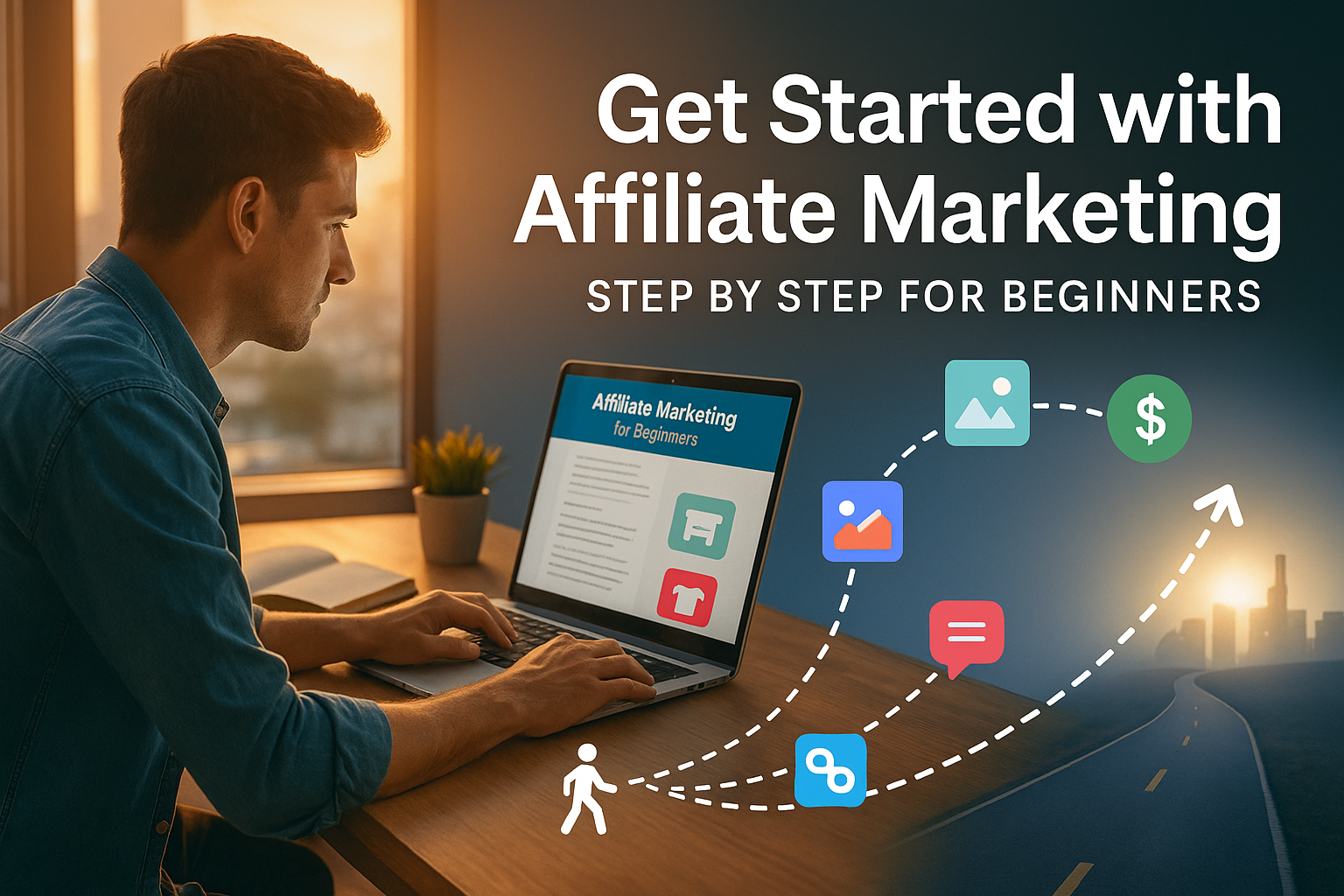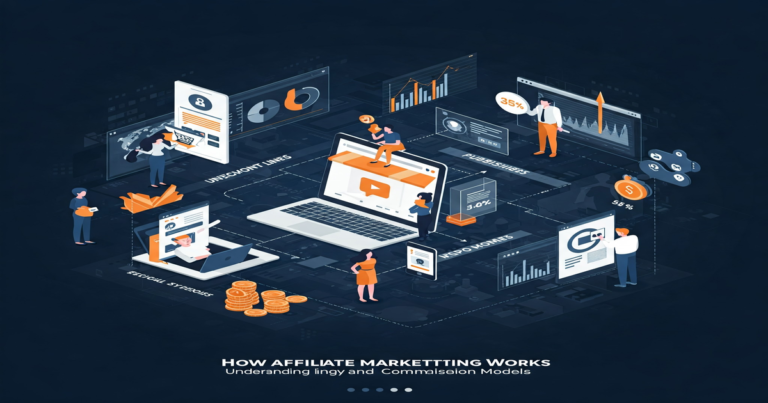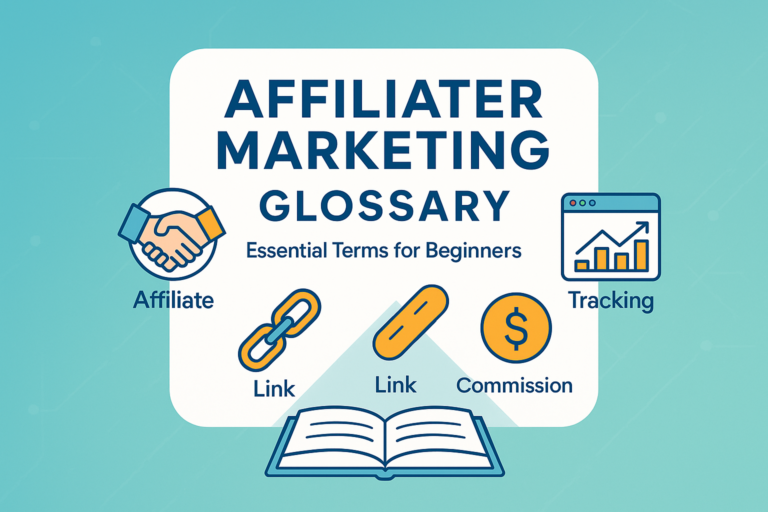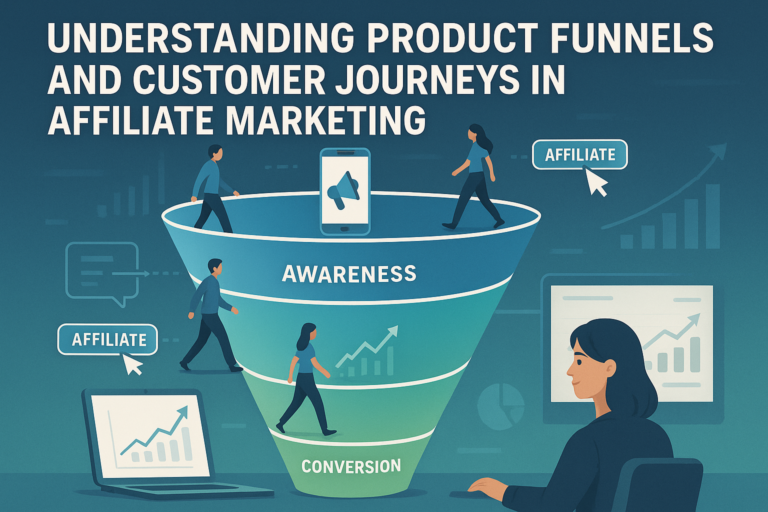Get starting Affiliate Marketing Step by Step for Beginners
Starting affiliate marketing can be empowering, even with little audience or online presence. Sean Ogle’s story is inspiring. He earned income quickly in Bangkok, promoting a product he loved. This shows affiliate marketing’s potential for beginners.
In our guide, we’ll cover all you need to know to start affiliate marketing. We’ll talk about what it is, choosing the right products, and getting traffic. It’s all about learning, planning, and promoting products you believe in.
Key Takeaways
- 79% of online companies use affiliates to promote their products and services.
- People spent six hours and 35 minutes online daily in 2023.
- 65% of affiliate marketers use blogging to get traffic.
- Brands can pay up to 20% commission for sales in affiliate programs.
- Affiliate marketing can lead to big earnings with genuine product recommendations.
I. Introduction to Affiliate Marketing
Affiliate marketing has changed how we earn money online. It lets us make money by promoting and selling other businesses’ products or services. Knowing the affiliate marketing basics helps us start a profitable and flexible income stream.
Brief overview of affiliate marketing
Affiliate marketing is about promoting products and earning a commission for each sale. It’s a growing field, with spending in the U.S. rising from $5.4 billion in 2017 to $8.2 billion in 2022.
Pat Flynn explains affiliate marketing in three ways: unattached, related, and involved. These categories show how much work and earning potential we can have.
Why choose affiliate marketing? (Benefits and earning potential)
Affiliate marketing is appealing because it’s easy to start and can lead to passive income. Experienced marketers can make around $8,038 a month. Even newbies can earn $636 a month.
- Low barrier to entry
- Possibility of passive income
- Flexibility to work from anywhere
The industry is expected to grow to $15.7 billion by 2024. This growth shows there are many opportunities in affiliate marketing.
Understanding the role of an affiliate marketer
As affiliate marketers, we connect consumers with products. We create content like reviews and tutorials to encourage purchases. Using affiliate marketing tips and affiliate marketing guide helps us do better and earn more.
We get special links to track referrals. Cookies also help us earn commissions even after the initial click. This makes affiliate marketing easy to scale and flexible.
In summary, knowing the affiliate marketing basics is key to diving deeper. It prepares us for making passive income or growing our earnings. Understanding these points is the first step on an exciting journey.
II. Prerequisites to Get Started
Starting your affiliate marketing journey needs more than just wanting to begin. You need the right mindset, skills, and resources. Success starts with a growth mindset, understanding digital marketing, and creating engaging content. It also means knowing the time and resources needed, like building a website or choosing the right channels.
This section helps beginners by highlighting these key steps. It sets realistic expectations for the dedication needed to succeed as an affiliate marketer.
Identifying the right mindset for affiliate marketing success
To succeed in affiliate marketing, you must have a growth mindset. This means being open to learning, facing challenges, and staying strong when faced with obstacles. Affiliate marketing can be very effective but requires dedication and perseverance.
Remember, success doesn’t happen overnight. It’s important to understand this for long-term success.
Required skills (digital marketing basics, content creation, etc.)
Having a solid base in digital marketing is crucial. Skills like SEO, social media marketing, and email marketing are essential. Also, being good at creating content, like writing blogs or making videos, helps attract and keep an audience.
Knowing how to use tools like Google Analytics and Rakuten can make your affiliate marketing easier.
- SEO and keyword research
- Content creation and copywriting
- Social media marketing
- Email marketing
- Use of analytics and affiliate management tools
Time and resources needed to become a successful affiliate
Success in affiliate marketing requires time and resources. Building a strong online presence, creating content, and growing your audience take a lot of time. Start by setting aside specific hours each week for your affiliate marketing work.
Here’s a basic breakdown of the time and resources you might need:
| Task | Hours Per Week | Resources |
|---|---|---|
| Content Creation | 6-8 hours | Writing tools, graphic design software |
| SEO Optimization | 3-4 hours | SEO tools like Ahrefs, Moz |
| Social Media Management | 5-6 hours | Social media schedulers |
| Email Marketing | 2-3 hours | Email marketing platforms like Mailchimp |
| Research & Learning | 2-3 hours | Online courses, industry blogs |
Brands should wait until they make at least $1M in ARR before starting an affiliate program. Having different affiliate partners and products is key to success. Understanding the basics and dedicating time to your efforts can lead to success as an affiliate marketer.
III. Choosing a Profitable Niche
Understanding the importance of a niche in affiliate marketing is key to success. A niche is a specific area within a market where you can focus your efforts. This focus helps you create content that truly resonates with your audience. By picking a niche that you’re interested in and is in demand, you set yourself up for long-term success.
What is a niche and why it matters in affiliate marketing
A niche is a specific part of a larger market, defined by certain interests or needs. It’s important in affiliate marketing because it lets you create content and promotions that are more likely to convert. When we talk about profitable niches, we’re looking for areas with engaged audiences who are likely to buy what you’re promoting. The best niches have a good balance of demand and not too much competition.
How to select a niche that matches your interests and market demand
Choosing a niche that you’re passionate about is crucial for staying motivated and engaged. Start by listing areas you’re interested in or have knowledge about. Then, research how much demand there is for them. For example, the wellness market was worth $4.37 trillion USD in 2020 and is expected to hit nearly $7 trillion USD by 2025. This makes it a very profitable niche for affiliate marketing.
Evaluating competition and profitability of a niche
After finding niches you’re interested in, it’s important to check their competition and profit potential. Tools like Google Trends and keyword research platforms can give you insights. For instance, niches like finance often have higher commission rates, but they also have a lot of competition. The fitness and pet care markets are also profitable, with many sub-niches to explore.
| Niche | Market Size/Growth | Commission Range | Key Insights |
|---|---|---|---|
| Tech & SaaS | $232 billion USD by 2024 | 5% to 30% | Recurring commissions of 33% to 50% |
| Wellness | $7 trillion USD by 2025 | – | Significant global market growth |
| Online Education | $53.13 billion USD by 2027 | – | High demand for educational content |
| Finance | High customer lifetime value | Higher than average | Great for long-term income |
| Gaming | Consistent profitability | High commissions | Engaged and loyal audience |
| Beauty & Cosmetics | Trending niche | – | High conversion rates |
| Home Décor | Popular on visual platforms | – | Engages audiences through aesthetics |
The key to choosing a good niche for affiliate marketing is to find a balance between your interests and market demand. This balance is the foundation for creating effective and profitable affiliate marketing strategies. It helps you build a loyal and responsive audience.
IV. Finding the Right Affiliate Programs
Starting with affiliate marketing means knowing the different programs out there. You’ll find Cost per Sale (CPS), Cost per Acquisition (CPA), and Cost per Lead (CPL). We’ll look at these options and help you pick the best for you.
Types of Affiliate Programs
Affiliate programs vary, each with its own payment method:
- Cost per Sale (CPS): You earn a commission for each sale made through your link.
- Cost per Acquisition (CPA): You get paid for each action, like signing up for a newsletter.
- Cost per Lead (CPL): You’re paid for every lead or potential customer you bring in.
How to Research and Find High-Paying Affiliate Programs
Looking for high-paying affiliate programs takes careful research. First, check:
- Commission rates: Look for high payout percentages.
- Product relevance: Make sure the products fit your niche.
- Cookie duration: Longer durations mean more chances to earn a commission.
Criteria for Choosing the Right Program
Choosing the best affiliate programs for beginners means looking at a few key things:
| Criteria | Importance |
|---|---|
| Commission Rates | High |
| Product Relevance | Critical |
| Cookie Duration | High |
| User Interface & Support | Medium |
| Negotiable Terms | Variable |
Examples of Popular Affiliate Networks
There are many trusted affiliate networks to explore:
- Amazon Associates: Offers a wide range of products.
- ClickBank: Has digital and physical products with good commissions.
- ShareASale: Offers different commission rates and cookie durations.
- Impact: Makes managing partnerships with global brands easy.
- FlexOffers: Great for newcomers with access to many products.
V. Building Your Online Presence
More than 80% of businesses use affiliate marketing to boost their website traffic and sales. Creating a website or blog is key to starting affiliate marketing. The right affiliate marketing website building approach is crucial for success.
Creating a Website or Blog for Affiliate Marketing
The first step in affiliate marketing website building is to create a platform for sharing valuable content. A website or blog is your main place to publish reviews, comparisons, and tutorials. It helps engage your readers.
Choosing the Right Domain Name and Web Hosting
Picking a domain name is important in domain selection for affiliate marketing. A catchy, specific domain name helps build your brand and boosts search engine visibility. Also, choose reliable web hosting to keep your site up and running smoothly, even when it’s busy.
Setting Up a Content Management System (CMS) like WordPress
WordPress is a top CMS for affiliate marketing website building. It’s easy to use, offers lots of customization options, and supports many plugins. These plugins can make your site work better and attract more visitors.
Essential Plugins for an Affiliate Site
To make your site better, add important plugins. Tools like Yoast SEO, ThirstyAffiliates, and WP Rocket can help with search rankings, affiliate links, and site speed. These plugins are key to keeping visitors interested and coming back, making your affiliate marketing site more effective.
VI. Content Strategy for Affiliate Marketing
A good content strategy is key for success in affiliate marketing. It helps drive engagement and sales. We’ll look at how to use different content types, write effective reviews, and optimize for SEO.
Types of Content That Drive Affiliate Sales
- Product Reviews
- Comparison Posts
- Tutorials
- Listicles
- Case Studies
These content types are vital for affiliate marketing. They offer value and help sell products. By creating a variety of content, we meet different audience needs.
How to Write Effective Product Reviews That Convert
Writing reviews that sell needs a mix of information and persuasion. Key points include:
- Detailed Description: Share all about the product’s features and benefits.
- User Experience: Talk about your own use or get feedback from others.
- Pros and Cons: Give a fair view to build trust.
- Visuals: Use great images and videos to grab attention.

Optimizing Content for SEO to Attract Organic Traffic
Good SEO for affiliate marketing means making content easy to find. Key steps include:
- Keyword Research: Find long-tail keywords that work well.
- On-Page SEO: Improve titles, headers, and meta descriptions.
- Backlinking: Get quality backlinks to boost your site’s authority.
- Multichannel Strategy: Use social media to reach more people.
Content Calendar and Planning for Consistency
Being consistent is crucial in creating content for sales. A content calendar helps plan and stay on track.
| Week | Content Type | Keywords | Due Date |
|---|---|---|---|
| 1 | Product Review | affiliate marketing content strategy | Jan 7 |
| 2 | Comparison Post | SEO for affiliate marketing | Jan 14 |
| 3 | Tutorial | content creation for affiliate sales | Jan 21 |
By using these strategies, we can make engaging content. This content will sell well and attract more visitors.
VII. Driving Traffic to Your Affiliate Offers
Getting more people to see your affiliate offers is key. It’s important to know the difference between organic and paid traffic. This helps you make a better plan.
Overview of Organic vs. Paid Traffic
Organic traffic comes from search engines without ads. Paid traffic uses ads on sites like Google Ads and Facebook Ads. Both are important for a good affiliate marketing plan.
SEO Basics for Affiliates (Keyword Research, On-Page SEO, Backlinking)
SEO is crucial for being seen in search results. It helps drive organic traffic. Here are some SEO basics:
- Keyword Research: Find keywords that many people search for but aren’t too competitive.
- On-Page SEO: Make your content, meta tags, and images better for search engines.
- Backlinking: Get quality links to your site to boost its authority.
Using Social Media for Affiliate Marketing (Instagram, Pinterest, YouTube, etc.)
Social media is great for reaching people. Sites like Instagram, Pinterest, and YouTube have special features for promoting offers. Good content, social proof, and working with influencers can really help.
Leveraging Email Marketing to Promote Affiliate Offers
Email marketing is very effective. Build a list and send out interesting emails. Using humor and adding value can make people more likely to open your emails.
Paid Advertising Options (Google Ads, Facebook Ads) and When to Use Them
Paid ads, like Google Ads and Facebook Ads, can be very effective. They help you reach the right people and can lead to more sales. Knowing when to use paid ads can really boost your marketing.
| Traffic Source | Strategy | Benefits |
|---|---|---|
| Organic Traffic | SEO (Keyword Research, On-Page SEO) | Cost-effective, sustainable, long-term results |
| Paid Traffic | PPC (Google Ads, Facebook Ads) | Immediate results, targeted reach |
| Social Media | Engaging Posts, Influencer Partnerships | High engagement, broad audience reach |
| Email Marketing | Personalized Campaigns | High conversion rates, direct communication |
VIII. Tracking and Optimizing Performance
Tracking is key in affiliate marketing. It lets us see how well our affiliate links are doing. Knowing how tracking tools work is crucial for better results.
Importance of Tracking Affiliate Links and Conversions
Tracking links and conversions shows us how well we’re doing. It helps us see what’s working and what’s not. This way, we can make smart choices based on data.
Tools for Monitoring Traffic and Performance
Tools like Google Analytics and ClickMagick give us deep insights. They help us understand our traffic and how users behave. This info is vital for improving our campaigns.
Understanding Key Metrics
Knowing key metrics is essential. Here are some important ones:
- Click-Through Rate (CTR): Shows how many people click on our links.
- Conversion Rate: Tells us how many people take action after clicking.
- Earnings Per Click (EPC): Shows how much we earn per click.
How to Analyze and Improve Underperforming Campaigns
To improve failing campaigns, we need to look at the data closely. We can boost our chances of sales by optimizing our content and links. Making the user experience better also helps.
- Check your metrics often to find weak spots.
- Try different things to see what works best.
- Make your landing pages better for more conversions.
- Use feedback to keep improving.
| Metric | Importance | Improvement Tips |
|---|---|---|
| Click-Through Rate (CTR) | High visibility and engagement | Compelling calls-to-action, eye-catching creatives |
| Conversion Rate | Direct impact on sales | Clear and relevant offers, seamless user experience |
| Earnings Per Click (EPC) | Overall profitability | Focus on high-converting offers, optimize traffic quality |
IX. Scaling Your Affiliate Marketing Business
To grow your affiliate marketing, you need smart plans. The market is expected to hit $15.7 billion in 2024. We’ll show you how to make more money, build your brand, and grow efficiently.
Diversifying Your Income Streams with Multiple Affiliate Programs
It’s key to have more than one affiliate program to make more money and lower risks. The top 10% of affiliate marketers earn about $73,000 a year. By working with different programs, you can reach more people.
Start with 1-2 (max 3) products before you grow. Tools like ExperienceAdvertising.com and PublisherFinders.com help manage programs and find good affiliates.

Building a Brand Around Your Affiliate Marketing Efforts
Building a strong brand is crucial for trust and followers. Share valuable content regularly. Create 10 short forms for each long-form piece to keep your audience engaged.
Use tools like WordPress, Mailchimp, and Buffer to make content, emails, and social media posts. This boosts your brand’s visibility.
Hiring Virtual Assistants and Outsourcing Tasks for Growth
As you grow, get virtual assistants and outsource tasks. This lets you focus on important things. Tools like ChatGPT and Affistash.com can make your work more efficient.
Automating affiliate checks helps manage risks and work better with partners. This saves time for planning.
Expanding into New Niches or Platforms
Entering new markets or platforms can make you more profitable. Research and analyze to find good niches. Create marketing funnels for different stages to boost conversions.
Use new places like Instagram, Pinterest, and YouTube for affiliate marketing. This brings in more people and keeps your business growing.
| Strategy | Tools | Benefits |
|---|---|---|
| Diversifying Income Streams | ExperienceAdvertising.com, PublisherFinders.com | Increased revenue, reduced risk |
| Brand Building | WordPress, Mailchimp, Buffer | Established authority, dedicated following |
| Hiring Virtual Assistants | ChatGPT, Affistash.com | Optimized operations, enhanced productivity |
| Expanding Niches/Platforms | Instagram, Pinterest, YouTube | Increased reach, new audiences |
By using these strategies, you can grow your affiliate marketing business. This will lead to more money and success over time.
X. Common Mistakes to Avoid when starting Affiliate Marketing
Starting in affiliate marketing needs careful planning and strategy. It’s key to avoid common affiliate marketing mistakes. These errors can slow your progress and cut your earnings. Let’s look at these mistakes and how to avoid them.
- Overreliance on Single Traffic Source: Relying on just one way to get traffic, like organic search or social media, is risky. Using different ways to get traffic, like content marketing and paid ads, can help you grow more steadily.
- Neglecting Content Quality: Many beginners focus too much on making lots of content. But, it’s more important to make content that’s engaging, useful, and meets your audience’s needs. Studies show that content aimed at people ready to buy can earn more.
- Ignoring SEO: SEO is crucial for making your content more visible. Beginners often forget the importance of finding the right keywords and optimizing their pages. These steps are key to getting more organic traffic to your affiliate links.
- Failing to Track Performance: It’s important to keep an eye on how well your campaigns are doing. Look at metrics like click-through rate, conversion rate, and return on investment. Without this data, it’s hard to know what’s working and what’s not.
- Not Adhering to Disclosure Requirements: Being open about your affiliate links is essential. Not disclosing them can hurt your audience’s trust and might even lead to legal problems.
It’s also important to promote products that are relevant to your audience. Knowing what your audience likes and needs helps you promote the right products. Setting achievable goals and managing your expectations is also key for lasting success.
Building a successful affiliate marketing business takes time, effort, and perseverance. By steering clear of these common affiliate marketing mistakes and using smart strategies, beginners can find their way to success in this field.
XI. Success Stories and Lessons from Established Affiliates
Learning from successful affiliate marketers can help us a lot. Their stories show us the importance of hard work, being flexible, and creative. These traits help them reach big goals.
Case Studies of Successful Affiliate Marketers
Many people and companies have done well in affiliate marketing. For example, Casino Guru makes $9.28 million a year with just 54 people. Pat Flynn, a well-known entrepreneur, blogger, and podcaster, has over $3 million in net worth. He started in 2008.
- Charles Ngo: Charles has been in the game for over nine years. He makes millions and has over 75,000 blog subscribers.
- Darren Rowse: Darren wrote “Problogger: Secrets for Blogging Your Way to a Six-Figure Income.” His blog, ProBlogger.net, gets over two and a half million visitors every month.
- Chris Guthrie: Chris started with selling Pokemon cards on eBay. He found success in affiliate marketing with Amazon in 2009.
- Matt Diggity: Matt’s companies make $400K a month. He’s a top expert in affiliate marketing.
- Nate O’Brien: Nate is famous for his financial advice. He has over 1.31 million YouTube subscribers.
Key Lessons and Takeaways from Their Journeys
These stories show how important it is to keep learning and understand your audience. The main points are:
- Consistent Learning: It’s key to stay up-to-date with new trends and strategies.
- Audience Engagement: Creating content that people value helps build trust and boosts sales.
- Adaptability: Being flexible with your plans can help you find better ways to succeed.
Maintaining Motivation and Resilience in the Face of Challenges
Staying motivated in affiliate marketing can be tough. But, learning from others and using smart strategies can help us stay strong.
For example, Levanta and Todays Business make $6 million a year. They show that a small team can achieve big things. Also, learning from Travel Blogging 101, which makes $660,000 a year with one person, can motivate us to keep going.
In short, learning from these affiliate marketing success stories can help us reach our goals and keep going in the long run.
XII. Conclusion
Starting in affiliate marketing is a big step. It takes hard work, smart planning, and being ready to change. Success comes from knowing a lot and putting in the effort every day. We learned the basics and how to pick a good niche and programs to promote.
Having a strong online presence is key. We can do this by making a website or blog, using Instagram and YouTube, and tools like Easy Affiliate. Almost 84% of publishers use affiliate marketing, showing it works well. Good planning, content, and ways to get more people to see our stuff are important.
Building a strong brand and always improving our campaigns are crucial. The numbers show affiliate marketing is big and getting bigger. It adds over $12 billion to the global economy and makes up 16% of e-commerce sales. Programs like Amazon Associates and Commission Junction prove it’s a good way to make money.
With commission rates from 5% to 75%, there are many ways to earn. Let’s keep going, learn from our mistakes, and use this guide to succeed in affiliate marketing.
Source Links
- https://www.shopify.com/blog/affiliate-marketing-for-beginners – Affiliate Marketing for Beginners: Your Startup Guide (2024) – Shopify
- https://www.locationrebel.com/how-to-start-affiliate-marketing/ – How to Start Affiliate Marketing for Beginners (Step by Step)
- https://www.bigcommerce.com/articles/ecommerce/affiliate-marketing/ – Affiliate Marketing 101: What it is and How to Get Started
- https://ahrefs.com/blog/affiliate-marketing/ – Affiliate Marketing For Beginners: What It Is + How to Succeed
- https://www.hostinger.com/tutorials/how-to-start-affiliate-marketing – How to start affiliate marketing in 2024: 6 steps to a successful affiliate business
- https://www.rightsideup.com/blog/prerequisites-launching-affiliate-program – 8 Prerequisites for Launching an Affiliate Program
- https://optinmonster.com/get-started-with-affiliate-marketing/ – What Is Affiliate Marketing? How to Start Affiliate Marketing
- https://cheq.ai/blog/7-best-niches-for-affiliate-marketing/ – 7 Best Niches for Affiliate Marketing in 2024
- https://www.getresponse.com/blog/best-affiliate-niches – 9 Best Niches For Affiliate Marketing & How to Choose Yours
- https://www.shopify.com/blog/affiliate-marketing-niches – 10 Best Affiliate Marketing Niches in 2024 – Shopify
- https://www.refersion.com/blog/finding-right-affiliate-platform/ – Top 7 Tips on Finding the Right Affiliate Marketing Platform
- https://affilimate.com/blog/affiliate-marketing/ – How to Start Affiliate Marketing in 2024 (7 Simple Steps)
- https://diggitymarketing.com/best-affiliate-programs/beginners/ – 20 Best Affiliate Programs For Beginners (2024 Guide)
- https://paykickstart.com/10-ways-to-improve-your-online-presence-as-an-affiliate-marketer/ – 10 Ways to Improve Your Online Presence as an Affiliate Marketer – PayKickstart
- https://www.affiliatemarketertraining.com/steps-building-online-presence-affiliate-marketing/ – Steps to Building an Online Presence Through Affiliate Marketing
- https://xperiencify.com/affiliate-marketing-strategies/ – 15+ Affiliate Marketing Strategies to Drive Sales in 2024! 💰
- https://ranking-articles.com/how-to-build-a-successful-affiliate-marketing-content-strategy/ – How To Build A Successful Affiliate Marketing Content Strategy » Ranking Articles
- https://www.lemlist.com/blog/affiliate-marketing-strategies – 10 Affiliate Marketing Strategies that Actually Work in 2024
- https://www.linkedin.com/pulse/8-effective-ways-drive-traffic-your-affiliate-offers-earn-bashar – 8 Effective Ways to Drive Traffic to Your Affiliate Offers and Earn Money
- https://www.shopify.com/blog/affiliate-marketing-without-a-website – 7 Strategies for Affiliate Marketing Without a Website (2023) – Shopify
- https://influencermarketinghub.com/affiliate-marketing-strategies/ – Top 8 Affiliate Marketing Strategies for 2024
- https://coschedule.com/marketing-strategy/affiliate-link-tracking – Affiliate Marketing: Comprehensive Guide To Affiliate Link Tracking
- https://phonexa.com/blog/affiliate-marketing-metrics/ – 15 Essential Affiliate Marketing Metrics in 2024- Phonexa
- https://www.wgu.edu/blog/affiliate-marketing2208.html – Beginner’s Guide to Affiliate Marketing and How to Start
- https://www.linkedin.com/advice/1/how-do-you-scale-automate-your-affiliate-marketing – How do you scale and automate your affiliate marketing business without sacrificing quality and trust?
- https://ultahost.com/blog/affiliate-marketing-mistakes/ – Affiliate Marketing in 2024: Avoid These 5 Mistakes
- https://commission.academy/blog/affiliate-marketing-mistakes/ – Top 10 Common Mistakes Every Affiliate Marketer Should Avoid In 2024
- https://www.starterstory.com/ideas/affiliate-marketing-business/success-stories – Starter Story: Learn How People Are Starting Successful Businesses
- https://earnkaro.com/blog/affiliate-marketing-success-stories/ – 10 Inspiring Affiliate Marketing Success Stories For 2024
- https://easyaffiliate.com/blog/history-affiliate-marketing/ – A Short History of Affiliate Marketing
- https://surferseo.com/blog/start-affiliate-marketing/ – A Beginner’s Guide To Start Affiliate Marketing [with examples]







